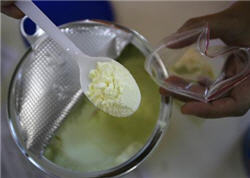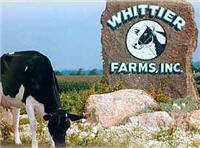China’s chief quality supervisor was replaced today as the total number of children sickened from dairy products tainted with melamine (the same substance that was found in contaminated pet food last year) grew to 53,000. Nearly 13,000 children have been hospitalized and 4 have died. Products manufactured by 22 companies were found to contain melamine, says Bloomberg.
milk

10,000 Babies May Have Consumed Poison Milk
Remember melamine, last year’s pet-killing poison? It’s back with a vengeance, and this year it wants Chinese babies. As many as 10,000 may have consumed melamine-laced milk powder, according to authorities. Even worse, a New Zealand company detected the poison weeks ago but couldn’t convince local officials to issue a recall. Only after New Zealand Prime Minister Helen Clark demanded action did the Chinese recall the death milk.
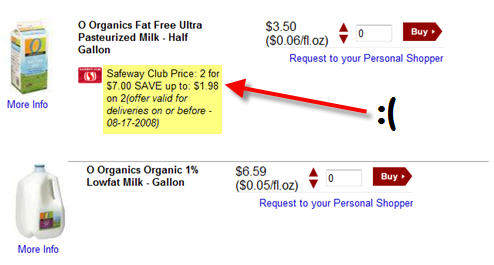
Do Not Be Fooled By Safeway's 2 for $7 Milk Trick
While shopping at Safeway today I noticed something odd about the “O” Organics Milk. After I listened to a mom tell her daughter she buys “whatever is on sale” I went to purchase my own milk and realized that’s not such a good plan. A half gallon was on sale for 2 for $7. Or if your a savvy shopper you could buy a gallon for $6.59. The Safeway website confirms it.

Why Most Organic Milk Stays Unspoiled Longer
An interesting sidebar in our “Is Your Milk Spoiling Faster?” discussion is why does most organic milk stay fresher longer? It’s not because the cows are free of bovine-growth-hormone and the commune-members sing them lullabies every night.
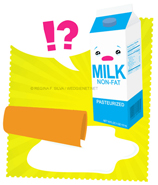
Is Your Milk Spoiling Faster?
I hosted a shrinking product chat over at WashingtonPost.com this morning and an interesting comment from someone in New Orleans came up about milk going bad:
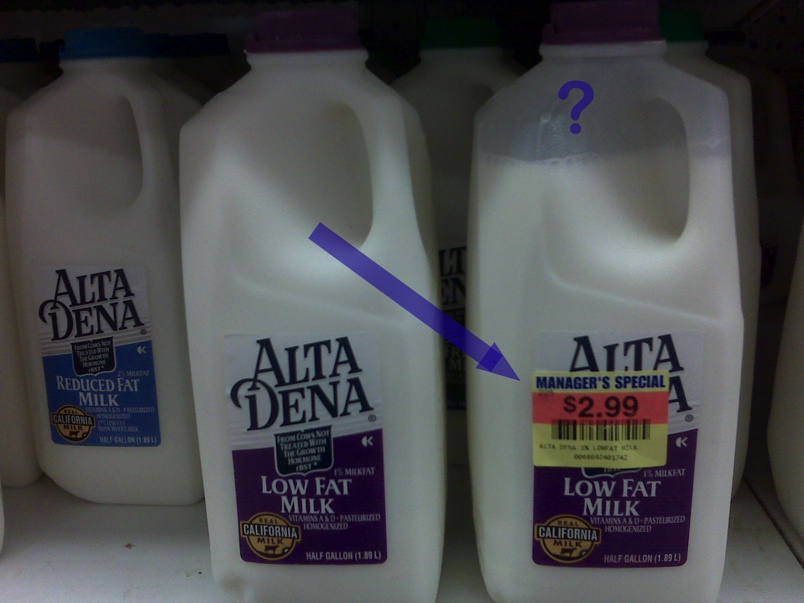
This Partially Filled Half-Gallon Of Milk Is Reasonably Priced
Pretend you’re a manager at Ralph’s and you notice two-inches of milk missing from one of your half-gallon milk containers. What do you do?
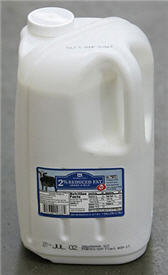
Will New Square Milk Jugs At Wal-Mart, Costco Save The Planet? Or Spill Your Milk?
Wal-Mart and Costco have something new they’d like you to try— a square milk jug. The NYT says the new square jugs “are cheaper to ship and better for the environment, the milk is fresher when it arrives in stores, and it costs less.” So what’s the catch? Apparently, while the new jugs are helping cut costs, they kind of suck at pouring milk.
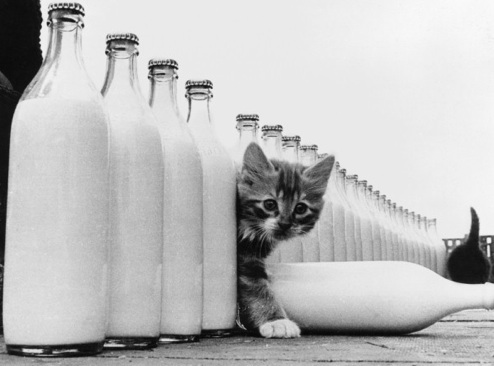
New York City: 86% Of Milk Sellers Are Price-Gouging Customers
Sorry New Yorkers, but according to the City Council, you’re overpaying for both rent and milk. Anyone charging more than $3.93 for a gallon—86% of the city’s milk sellers, from bodegas to Whole Foods—is violating the state’s milk price-gouging law.
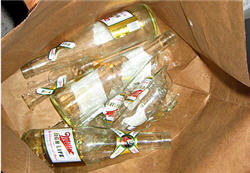
Well, Gas Is Still Cheaper Than The Champagne Of Beers…
With gas prices topping $4.00 a gallon in Chicago, Chicagoist started wondering how much gallons of other liquids cost. Turns out gas is still cheaper than the Champagne of Beers…

New Dairy Law In Ohio Designed To Strangle "rBGH-free" Labeling
Monsanto failed to get the FDA to ban “rBGH-free” labeling nationally, and it’s had mixed success at the state level. Now the company and its gang of ethics-free dairy farmers (those are the ones who use rBGH to increase profits, but want that truth kept out of the marketplace because it’s unpopular with consumers) have scored a significant win in Ohio this week. Yesterday the state passed a law that forces extra, rBGH-friendly fine print on every milk label that promotes itself as “rBGH-free.” The goal of the ruling: to require expensive label redesigns on competitors, and to crowd the label with unnecessary fine print in order to dilute the marketing power of the “rBGH-free” label.
../../../..//2008/03/10/an-astroturfing-group-started-by/
An astroturfing group started by chemical supergiant Monsanto is trying to stop the spread of milk that’s free of bovine synthetic growth hormone. They say they’re trying to defend farmer’s rights but they can’t fool us, we know they really just want to make the future safe for large breasts. [NYT]

Monsanto Is Trying To Ban Hormone Labeling At The State Level
Monsanto continues its attempts to hide the basic facts of food production from consumers, this time in Kansas. The Kansas Dairy Association, along with a suspicious “grassroots” dairy group that has the same public relations firm as Monsanto, has helped introduce a bill to the state Senate that would ban “growth hormone-free” milk labels. The bill’s supporters argue that growth hormone can’t be found in lab tests, and if a lab can’t verify it, consumers don’t need to be told about it.
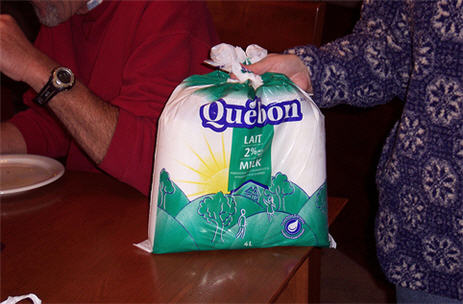
Save The Planet: Buy Big Bags Of Milk
Other countries cut down on the amount of plastic used to package milk by buying it in big plastic bags and storing it in a reusable milk pitcher in the fridge.

Organic Milk Is Off The Menu At Starbucks Starting Feb. 26
Starbucks made the switch to recombinant bovine growth hormone-free milk and are taking organic milk off the menu in all of their stores, effective Feb. 26.
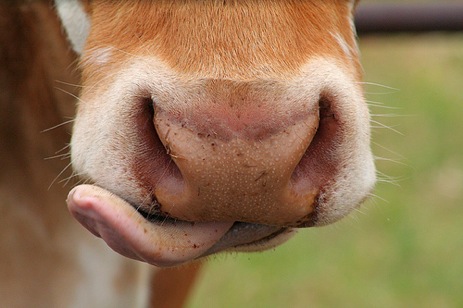
California's Raw Milk Suppliers Soured By Tough Bacteria Standards
California dairies are bristling under regulations that limit the amount of yucky coliform bacteria allowed in raw milk. The new health standards set a maximum of 10 coliforms per milliliter, which upsets Mark McAfee, the founder of California’s largest raw milk dairy. According to McAfee, “There’s quite a ruckus right now.” Let’s see how he frames the issue.

"Artificial Hormone Free" Milk Labels Soon To Be Illegal In Pennsylvania
Consumer Reports says that “without warning or public discussion” 19 dairies in Pennsylvania were notified that their labels were “false or misleading and need to be changed.” What did the labels say?
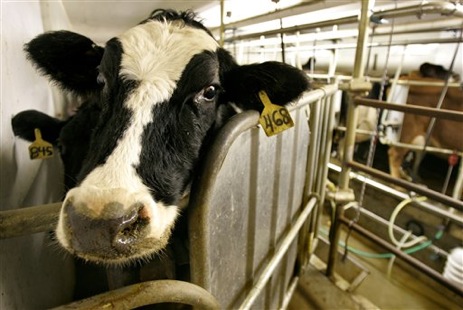
Organic Principles, Regulations Ignored By Nation's Largest Organic Dairy
Consumers in twenty-seven states are suing Aurora Dairy, the nation’s largest organic dairy for selling milk that failed to meet basic organic standards. The suit is bolstered by findings from USDA inspectors, who found that between December 2003 and April 2007, Aurora: “labeled and represented milk as organically produced, when such milk was not produced and handled in accordance with the National Organic Program regulations.”


